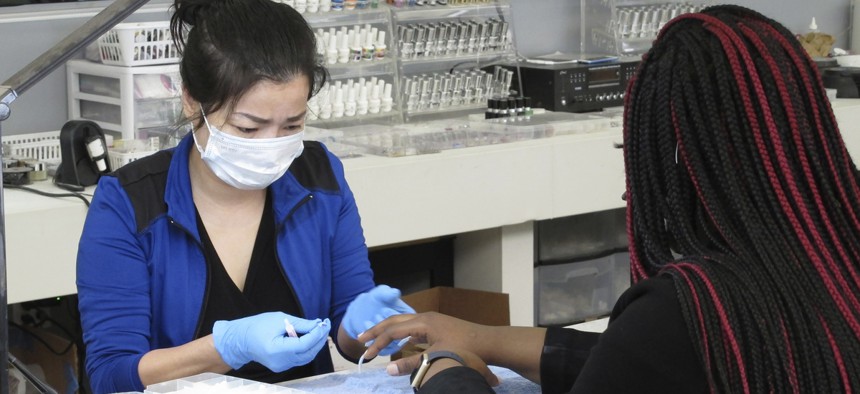Connecting state and local government leaders
Health experts say the flood of visitors could prolong the pandemic and lead to a rash of new cases of coronavirus.
Georgia saw an influx of out-of-state visitors as the first state on the east coast to reopen parts of its economy. According to a new analysis of smartphone data from the University of Maryland, incoming trips across the state line rose by 13% after Georgia began reopening on April 24—which means an additional 62,000 out-of-state visitors made the trip in each day.
The vast majority of visitors to Georgia—about 92%—came from the neighboring states of Alabama, South Carolina, Tennessee and Florida, where reopening of certain services has been more gradual. Georgia was the first to allow dine-in restaurants, personal service businesses like barbershops and nail salons, and entertainment venues like movie theaters and bowling alleys to start operations if they followed certain guidelines, although other states are following.
During his weekly coronavirus update on May 5, Savannah Mayor Van Johnson tried to remind people that the state still has a public health emergency declaration in place until at least June 12. He also expressed concern that out-of-state visitors could be asymptomatic carriers who infect residents of his city during their travels. “I met a couple that was from out of town over the weekend that indicated to me the reason why they came to Georgia was because Georgia was open,” he said. “To me that’s the message: that we’ve essentially opened ourselves up to the world.”
So far, more than a dozen states have announced plans to gradually phase out restrictions imposed to slow the spread of the coronavirus. But as businesses reopen and those who have stayed inside start to venture back out of their homes, data shows that people are not taking social distancing, particularly the recommendation to largely remain at home if possible, as seriously as they once were. Since late April, the percentage of people staying home, avoiding taking non-essential trips, and practicing physical distancing has dropped nationwide, and particularly so in Georgia.
Public health experts in recent days have sounded the alarm that it is too soon for people to be letting down their guard in this way, saying that without proper precautions in place as restrictions are loosened—like sufficient testing and the ability to trace the spread of new cases—the infection rate is likely to climb back up.
Caitlin Rivers with the Johns Hopkins Center for Health Security last week told a House subcommittee that no state meets the criteria to reopen. "We risk complacency in accepting the preventable deaths of 2,000 Americans each day,” she said. “We risk complacency in accepting that our health care workers do not have what they need to do their jobs safely. And we risk complacency in recognizing that without continued vigilance, we will again create the conditions that led to us being the worst-affected country in the world.”
For the University of Maryland report, researchers collected location data from cell phones. They concluded that the more relaxed attitude that some state leaders have taken about easing out of pandemic restrictions is having an impact, as the states showing more movement are those with fewer restrictions.
“Our data suggests that the partial reopening orders in some states have prompted a sharp increase in mobility behavior and decreasing social distancing across the nation,” Lei Zhang, the lead researcher on the report, said in a statement. “What’s particularly interesting is that the large increases in the number of trips is not attributable to the reopened businesses alone. People are responding to partial reopening by making more trips across the board.”
The increase in travel has been met with alarm by health experts, including White House coronavirus task force member Dr. Deborah Birx. When asked about the data during a CNN town hall last week, Birx said that those who choose to make interstate trips do so at their own risk. “I think it also puts themselves at risk, those who chose to come into an area where we know that there is still a circulating virus,” she said.
Gov. Brian Kemp, however, has remained optimistic about the state’s progress in battling the coronavirus. On Saturday, he tweeted that the state recorded the lowest number of patients hospitalized with coronavirus statewide since April 8 and the lowest total number of ventilators in use since the pandemic began. “We will win this fight together!” he wrote.
But researchers in Georgia who have been working to create more accurate models about how the pandemic will play out say that the focus shouldn’t just be on what’s happening in the moment, but also on what could happen if the number of people visiting the state continues to grow.
Pinar Keskinocak, the director of the Center for Health and Humanitarian Systems at Georgia Tech, said residents of the state should tread cautiously. “Our models predict that the peak is ahead of us, [along with] shortages for hospital beds, ICU beds, and ventilators,” she said. “How soon we will see another peak, the size of the peak, or whether we see multiple peaks, will depend heavily on the public’s physical interactions in the coming days and weeks.”
Keskinocak said that social distancing is the most effective tool to prevent an upward trajectory in the state’s numbers. “I urge everyone to continue physical distancing and wearing masks to the extent possible,” she said.
Emma Coleman is the assistant editor for Route Fifty.

NEXT STORY: Hospice Care Continues—Without the Human Touch




